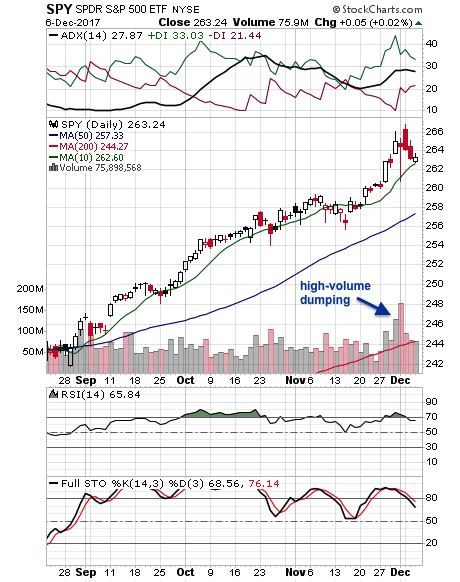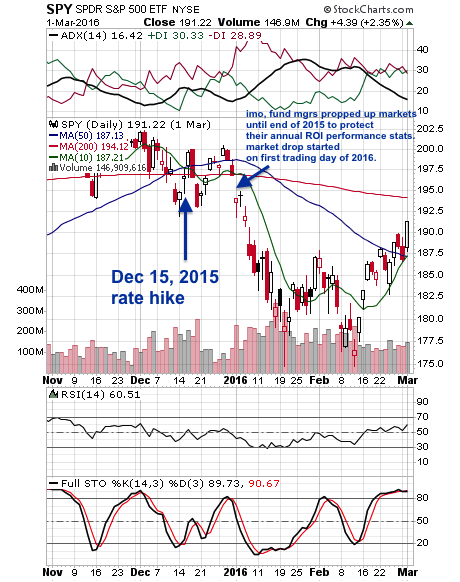Friday, December 08, 2017 10:44:16 AM
due to fund mgrs propping up the market til the 2017 books close
to preserve their ROI performance stats for 2018 marketing pitches.
check the chart from dec 2015 into jan 2016, after dec 15, 2015, rate hike.
(chart inlined below for quick ref.)
wildcard being the timing of the tax cut
which i expect to kick some nitro into the market
boosting many stocks ~20% higher within 2 qtrs of it enacting.
my detailed thoughts below, from a post to friends.
not much new in there for most folks on this board.
but explains my logic in detail.
------ ------ ------ ------ ------
three market-influencing events are happening this month.
the nutshell is that markets might experience some drops in coming weeks
before rocketing to new all-time-highs for the foreseeable future.
details below...
--- 1. over the past couple weeks,
heavyweight tech stocks experienced steep high-volume selloffs
that were not driven by per-company news.

while this is a handful of stocks, consider:
[[ More than half of October's solid gains came from just five technology stocks:
Facebook: up 15.5 percent
Amazon: up 12.5 percent
Apple: up 8.2 percent
Google: up 6.1 percent
Microsoft: up 6 percent
Technology stocks account for 75 percent of the gain in the S&P 500, according to Standard & Poor's.
Without technology, the S&P would only be up about 0.5 percent.
Five stocks accounted for 52 percent of the gain in the entire S&P 500 in October. ]]
https://www.cnbc.com/2017/10/31/more-than-half-of-octobers-solid-gains-come-from-just-five-technology-stocks.html
the impact of the selloffs is evident in the chart of the S&P index ETF, SPY.
note the volume of the market selloff compared to the volume of the steady rallies prior.

--- 2. next week, on dec 13th @ 14:00 EST,
the FOMC is primed to announce another 0.25% interest rate hike,
an event that traditionally induces some migration of investment capital out of stocks into bonds, while also increasing cost of new debt for growth companies.
this hike is anticipated by pretty much all market players,
so many assume its effects are already priced into markets.
history offers some pause for thought on that:
two years ago, dec 15, 2015,
the FOMC enacted an anticipated interest rate hike of 0.25%.
http://money.cnn.com/2015/12/15/news/economy/fed-rate-hike-2-minutes/index.html
immediately after the rate hike, markets rallied for a day, and remained at altitude until the end of 2015,
but plunged in a 12% market selloff the first two trading weeks of 2016.
this, imo, because fund mgrs propped up markets until end of 2015
to protect their annual ROI performance stats until close of 2015.
the market drop started on jan 4th, the first trading day of 2016.

--- 3. the US senate and house have both passed tax cuts that would reduce corporate taxes 15% (from 35% to 20%).
meaning every USA corp will suddenly have 15% of its pre-tax margins available as a cash bonus.
while the GOP & Trump are claiming tax cuts will induce 3%+ growth and job creation,
pretty much every single CEO, when asked in last month's quarterly conference calls how they will spend the tax cuts,
assured investors they will spend the money on stock buybacks and dividends.
ie: buying back their own stock to artificially boost it higher
and increasing the periodic kickbacks investors get for holding their stock.
https://www.bloomberg.com/news/articles/2017-11-29/trump-s-tax-promises-undercut-by-ceo-plans-to-reward-investors
imo, this will have four parallel effects on stock prices:
a) stocks are (theoretically) driven by price/earnings ratios.
earnings are after-tax profits.
a 15% reduction in corp taxes will result in an instant 23% increase in earnings in the books of every profitable company.
(100% - (35% prior tax) == 65%;
15% / 65% == 23%).
in a linear logical market based strictly on price/earnings ratios,
this would result in an instant ~23% gain in stock price for healthy companies.
b) companies buying back their own stocks artificially increases the share price higher than ambient market sentiment.
c) larger dividends increase the intrinsic value of a stock.
d) perception of companies using the newfound cash for growth
will induce a halo boost anticipating that growth.
(of course, misguided, given the above-noted CEOs promise to shareholders...)
--- nutshell, the next few weeks into january could get ugly.
but with 15% corp tax cut plans passing both senate and house,
it's only a matter of time before they agree on a unified bill
to pass on to Trump's rubber stamp.
given the pressure by both the elite (eg: Koch bros) and Trump,
the rubber stamping might happen by end of 2017,
possibly averting another jan selloff like the one in 2016.
and, per above logic, the tax cut passage seems destined to kick nitro into the struggling bull market
despite S&P market price/earnings ratios being higher than any time in history, except dotcom bubble,
including pre-1929 crash...
http://www.multpl.com/shiller-pe/
and corp debt being at all time highs, while still increasing steeply...
https://fred.stlouisfed.org/series/NCBDBIQ027S
etc...
because all manner of "fundamentals" logic left the building decades ago.
on an uplifting note, at least fed reverse repos (quiet bank bailouts) seem to be finally declining
after 3 years of alarming multi-hundred-billion sloshing chaos.
https://fred.stlouisfed.org/series/RREPT
99.99% of all pinks are scams. Best to assume the other 0.01% are as well.
Recent SPY News
- Form NPORT-P - Monthly Portfolio Investments Report on Form N-PORT (Public) • Edgar (US Regulatory) • 08/28/2024 02:37:27 PM
- Form N-30D - Annual and semi-annual reports mailed to shareholders [Rule 30d-1] • Edgar (US Regulatory) • 05/30/2024 05:11:58 PM
- Form 497 - Definitive materials • Edgar (US Regulatory) • 05/29/2024 07:34:56 PM
- Form NPORT-P - Monthly Portfolio Investments Report on Form N-PORT (Public) • Edgar (US Regulatory) • 05/28/2024 06:12:34 PM
- Form NPORT-P - Monthly Portfolio Investments Report on Form N-PORT (Public) • Edgar (US Regulatory) • 02/27/2024 09:08:56 PM
- Form 497 - Definitive materials • Edgar (US Regulatory) • 01/29/2024 03:40:28 PM
- Form 485BPOS - Post-effective amendment [Rule 485(b)] • Edgar (US Regulatory) • 01/26/2024 09:50:00 PM
- S&P 500 Expected to Be Volatile This Week • Finscreener.org • 12/11/2023 10:21:00 AM
- MCD Stock: Is McDonald’s a Good Buy Right Now? • Finscreener.org • 12/11/2023 09:55:00 AM
- S&P 500 Index: Should You Expect a Santa Claus Rally In 2023? • Finscreener.org • 12/04/2023 10:15:00 AM
- Uber Stock Spikes On Its Inclusion in the S&P 500 Index • Finscreener.org • 12/04/2023 09:59:00 AM
- Form N-30D - Annual and semi-annual reports mailed to shareholders [Rule 30d-1] • Edgar (US Regulatory) • 11/29/2023 08:08:28 PM
- How Does ETF Investing Help Create Long-Term Wealth? • Finscreener.org • 11/27/2023 10:07:00 AM
- Can Tech Stocks Continue to Gain Pace This Week? • Finscreener.org • 11/20/2023 10:43:00 AM
- Will the S&P 500 Index Move Higher This Week? • Finscreener.org • 11/13/2023 09:54:00 AM
- Meta Stock Slumps Despite Beating Estimates • Finscreener.org • 10/26/2023 10:12:00 AM
- The S&P 500 Index Likely to Remain Volatile in Q4 of 2023 • Finscreener.org • 10/02/2023 09:23:00 AM
- Will the S&P 500 Gain Pace in the Final Week of September? • Finscreener.org • 09/29/2023 10:22:00 AM
VHAI - Vocodia Partners with Leading Political Super PACs to Revolutionize Fundraising Efforts • VHAI • Sep 19, 2024 11:48 AM
Dear Cashmere Group Holding Co. AKA Swifty Global Signs Binding Letter of Intent to be Acquired by Signing Day Sports • DRCR • Sep 19, 2024 10:26 AM
HealthLynked Launches Virtual Urgent Care Through Partnership with Lyric Health. • HLYK • Sep 19, 2024 8:00 AM
Element79 Gold Corp. Appoints Kevin Arias as Advisor to the Board of Directors, Strengthening Strategic Leadership • ELMGF • Sep 18, 2024 10:29 AM
Mawson Finland Limited Further Expands the Known Mineralized Zones at Rajapalot: Palokas step-out drills 7 metres @ 9.1 g/t gold & 706 ppm cobalt • MFL • Sep 17, 2024 9:02 AM
PickleJar Announces Integration With OptCulture to Deliver Holistic Fan Experiences at Venue Point of Sale • PKLE • Sep 17, 2024 8:00 AM






